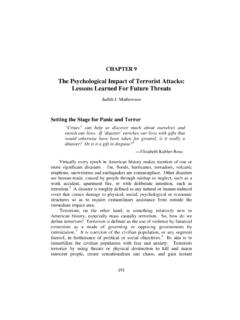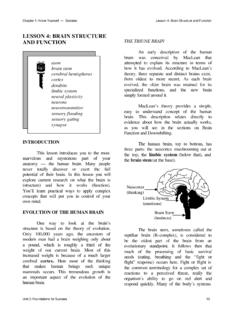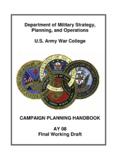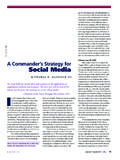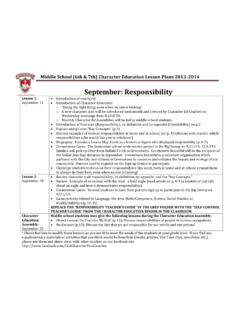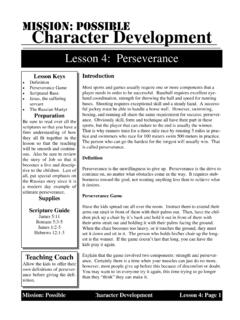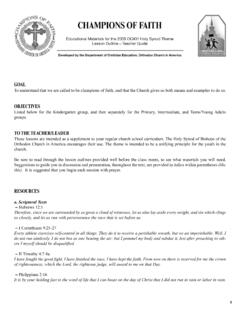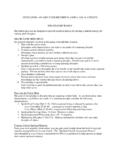Transcription of LESSON 5: MOTIVATION must learn how to influence the ...
1 Chapter 2: Knowing How to Lead LESSON 5: MOTIVATION 66 Unit 2: Leadership Theory and Application LESSON 5: MOTIVATION INTRODUCTION Studying human behavior helps leaders to acquire the knowledge they need to better understand themselves and those they lead. It is important that leaders learn why human beings act and react in certain ways and to identify various types of behavior. They also must learn how to influence the behavior of subordinates so that their personal goals complement or reinforce the goals of management.
2 MASLOW S HIERARCHY OF NEEDS According to psychologist Abraham H. Maslow, human beings are influenced by a progression of needs. In Maslow s theory, human needs develop from lower to higher needs (see the illustration of a pyramid). Maslow believed that although relatively few people reach the top level, those needs lie dormant in all of us. To be creative in the way we conduct our lives and use our talents, we must first satisfy the basic needs.
3 The satisfaction of these basic needs motivates people to reach higher levels. It is important to remember that one person s needs are the same as those of another they simply vary in the degree of importance. Thus, people generally behave in a way that first satisfies their needs for physical comfort and safety, then they satisfy their needs for social acceptance and ego gratification. alleviate biological needs complement ego gratification esteem human needs incentive initiative intangible neutral norms prejudice (-ial) progression status PURPOSE Leaders spend a great deal of time and effort studying the technical aspects of their jobs.
4 However, in order to lead effectively, they must also know what makes people tick. By studying human behavior, leaders learn why people act and react in certain ways. Plus, leaders who care about their subordinates and are attentive to their needs are more able to influence them in accomplishing unit goals. This LESSON identifies those basic needs and it explains how they can be satisfied. Chapter 2: Knowing How to Lead LESSON 5: MOTIVATION Unit 2: Leadership Theory and Application 67 LEADERSHIP DEMANDS THE STUDY OF HUMAN NATURE AND BEHAVIOR In order for leaders to motivate, they must satisfy both the personal needs of their subordinates as well as their work-related goals.
5 Therefore, to lead effectively, leaders must demonstrate that they value and support their subordinates. Simple acts of kindness or an indication that they care about their sub-ordinates can often change a poor attitude to a better one. The leadership principle, know your subordinates and look out for their welfare (or well-being) goes hand-in-hand with this discussion of MOTIVATION and human needs. Leaders must know and understand the members of their unit.
6 It is not enough just to know a team member s name. As a leader, you need to understand them as individuals their interests, values, and attitudes. In short, you must know why they act the way they do. Commit time and effort to listen to and learn about them. Try to observe, become personally acquainted with, and recognize them as individuals with different backgrounds and different personalities. To be successful in this principle, you must have a knowledge of individual and group behavior without this knowledge, you cannot understand the why of your followers actions.
7 The behavior of team members is often driven by their desire to satisfy certain physical and safety needs. Whether or not they put their best effort in the performance of their duty and achieving the unit s goal depends on the satisfaction of those needs. By showing that you care, you can earn their trust and respect. If they trust you, they will willingly work to help you accomplish the mission. Leaders need the support of fol-lowers in order to accomplish their goals.
8 If leaders understand subordinates needs and either satisfy them or help to satisfy them, leaders can influence behavior to some degree. Human nature is the common set of qualities shared by all human beings. Some of these qualities are beliefs, values, and character traits. Other aspects of human nature are the potential for good and bad behavior, stress factors, and human needs. In this chapter, we will concentrate on the human needs.
9 HUMAN NEEDS For years, scholars have studied human behavior and have offered hundreds of explanations of human nature and instinct and how they affect actions. There are certain factors, elements, or needs that cause people to behave in certain ways and do certain things. The most basic of these factors is human needs. Human needs are those necessary for a person s existence and for mental and emotional stability. The human needs required for existence are physical or biological needs; in addition to food and water, they include the need for safety and security.
10 Safety needs are one of the most basic of the biological needs and include the desire for security and for law and order. People need to feel secure. A leader quickly loses respect if he does not show genuine concern for the safety needs of subordinates. A leader s lack of concern for this need is quickly evident to perceptive people and affects their MOTIVATION to follow the leader into dangerous situations. Chapter 2: Knowing How to Lead LESSON 5: MOTIVATION 68 Unit 2: Leadership Theory and Application The psychological needs provide for mental and emotional stability: belonging or social acceptance, esteem, and self-fulfillment.
